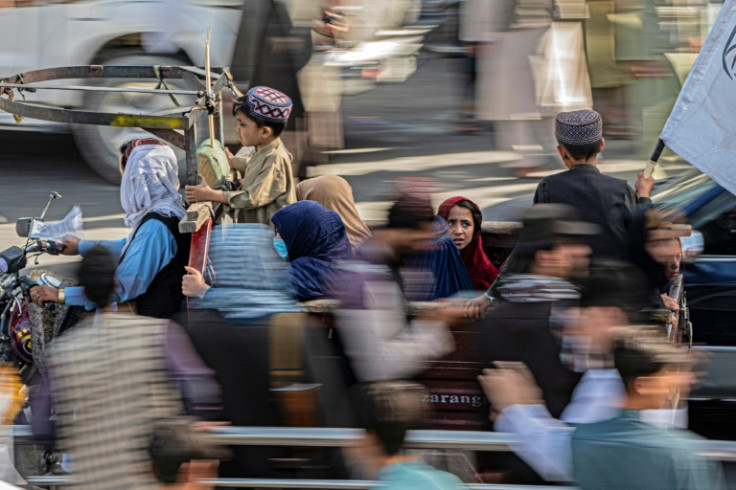Taliban bans women from visiting national park in Afghanistan
The ban on visiting Band-E-Amir Park is the latest in a long list of activities that women have been banned from doing.

In their latest diktat restricting women's access to public places, the Taliban have banned women from visiting one of Afghanistan's most famous national parks. The directive was released on Saturday, and involves the Band-e-Amir National Park, located in the central Bamiyan province. It is a popular tourist attraction that gets thousands of visitors every year.
Afghanistan's acting minister of virtue and vice, Mohammad Khaled Hanafi, said that women had not been wearing the hijab properly inside the park and asked security forces to stop them from entering the park until the government finds a "solution."
"Going sightseeing is not a must for women," he added.
In Band-e-Amir's breathtaking beauty, Zahra Elham sings a song, her soothing tones embracing the landscape's soul. Now, the Taliban's shadow darkens this sacred land, denying women its untarnished embrace. pic.twitter.com/dH41hlcEZJ
— Habib Khan (@HabibKhanT) August 27, 2023
One day when Afghanistan is free again from the Taliban, we will go to Band E Amir again and all the girls and women will take the boats out into the lake.
— Peymana Assad 🏔🇦🇫 (@Peymasad) August 27, 2023
Photo: Me and my sister in Bamiyan, Band E Amir when Afg was free of Taliban rule🇦🇫 pic.twitter.com/BnQW1jaLCg
The Taliban have issued several directives banning women from public spaces since they took over the country in August 2021. They have even adopted a unique strategy to implement all these restrictions.
They insist that a certain restriction will be put in place on a temporary basis, however, that restriction is never really removed. The ban on visiting Band-E-Amir Park is the latest in a long list of activities that women have been banned from doing, per TOLO News.
Richard Bennett, the UN special rapporteur on the situation of human rights in Afghanistan also took to Twitter (now X) to question the need to issue such a directive. "Can someone please explain why this restriction on women visiting Band-e-Amir is necessary to comply with sharia and Afghan culture?" he asked.
Afghanistan is in the middle of the world's largest humanitarian crisis, with nearly 20 million people needing assistance, but the Taliban chooses to focus on taking the country back to the 90s instead of trying to fix the crumbling economy.
Afghanistan is now a graveyard of women's rights and freedom:
The latest ban comes a few weeks after the Taliban regime banned young girls from getting an education. The government directed schools not to admit girls after the third grade.
Last year, it banned girls from attending school beyond the sixth grade. Now, the education institutes have reportedly been asked to ensure that girls over 10 years old are not allowed to study in primary schools.
The Taliban barred girls from attending secondary schools after taking over Afghanistan in August 2021, while the ban on higher education was announced in December last year. It had initially promised that it would reopen the schools for girls beyond the sixth grade, but it backtracked on its decision, just hours before the schools were set to open last year.
They have been banned from attending senior secondary and higher secondary schools, from attending classes in universities, and from working in government and private offices. They have even been banned from visiting parks, gyms and public baths.
The Taliban also recently decided to shut down women's beauty salons in the country. Some reports also claimed that the Taliban was forcing women to go back to their abusive ex-husbands.
The women have also been asked to be accompanied by a male relative if they step out of their houses. The policy has limited their chances of getting employed, thereby making them more vulnerable.
The Taliban barred women from holding public office and other leadership positions at the beginning of their new reign. The UN has urged the government to revoke its policies targeting women and girls; however, the request has fallen on deaf ears.
The Taliban promised a softer approach but has been taking steps to gradually eliminate women from public life and spaces. Women are being systematically targeted by the regime in Afghanistan. The Taliban is doing the same things that they did in the 1990s. They had banned women from pursuing education during their rule in the 1990s as well.
Women face harsh punishment if they violate any of the restrictions imposed by the government. The Western nations, the UN, and human rights organisations have all failed to hold the regime accountable for the human rights violations. Statements are issued condemning every ban, but the statements are never followed by actions. The people of Afghanistan, in particular, continue to wait in vain.
© Copyright IBTimes 2025. All rights reserved.





















